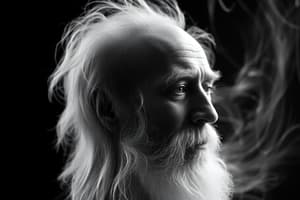Podcast
Questions and Answers
Carl Jung was born on July 26, 1875, in ______, a town on Lake Constance in Switzerland.
Carl Jung was born on July 26, 1875, in ______, a town on Lake Constance in Switzerland.
Kesswil
Jung’s father, Johann Paul Jung, was a minister in the Swiss ______ Church.
Jung’s father, Johann Paul Jung, was a minister in the Swiss ______ Church.
Reformed
Jung described his father as a sentimental idealist with strong doubts about his ______ faith.
Jung described his father as a sentimental idealist with strong doubts about his ______ faith.
religious
At age 3 years, Jung was separated from his mother, who had to be hospitalized for several ______.
At age 3 years, Jung was separated from his mother, who had to be hospitalized for several ______.
Jung became a psychiatric assistant to ______ Bleuler at Burghöltzli Mental Hospital in Zürich.
Jung became a psychiatric assistant to ______ Bleuler at Burghöltzli Mental Hospital in Zürich.
Jung studied for 6 months in Paris with ______ Janet, a successor to Charcot.
Jung studied for 6 months in Paris with ______ Janet, a successor to Charcot.
Jung married Emma ______, a young sophisticated woman from a wealthy Swiss family.
Jung married Emma ______, a young sophisticated woman from a wealthy Swiss family.
Jung eventually was able to create his unique theory of ______.
Jung eventually was able to create his unique theory of ______.
Carl Gustav Jung established a separate theory of personality called ______ psychology.
Carl Gustav Jung established a separate theory of personality called ______ psychology.
Jung believed that we are motivated by repressed experiences and certain emotionally toned experiences inherited from our ______.
Jung believed that we are motivated by repressed experiences and certain emotionally toned experiences inherited from our ______.
The concept of the ______ unconscious includes elements inherited from our ancestors.
The concept of the ______ unconscious includes elements inherited from our ancestors.
Jung defined the ______ as the center of consciousness but not the core of personality.
Jung defined the ______ as the center of consciousness but not the core of personality.
Contents of the personal unconscious are referred to as ______.
Contents of the personal unconscious are referred to as ______.
The personal unconscious is formed by ______ experiences unique to each individual.
The personal unconscious is formed by ______ experiences unique to each individual.
The collective unconscious represents Jung’s most ______ concept.
The collective unconscious represents Jung’s most ______ concept.
Universal concepts such as God and mother are part of our ______ unconscious.
Universal concepts such as God and mother are part of our ______ unconscious.
Flashcards are hidden until you start studying
Study Notes
Carl Jung's Background
- Born on July 26, 1875, in Kesswil, Switzerland, Carl Gustav Jung had a family influenced by religion and medicine.
- Father Johann Paul Jung was a minister; mother Emilie Preiswerk Jung descended from a theologian.
- Had a troubled early childhood, marked by separation from his mother during her hospitalization at age 3.
- Experienced emotional turmoil, associating "woman" with unreliability and "father" with reliability but powerlessness.
Professional Journey
- Initially interested in archeology; later pursued psychiatry as a psychiatric assistant to Eugene Bleuler at Burghöltzli Mental Hospital.
- Studied with Pierre Janet in Paris for six months from 1902-1903.
- Married Emma Rauschenbach in 1903, linking his personal life to a wealthy Swiss family.
Analytical Psychology
- Developed a distinct theory of personality called analytical psychology, diverging from Freud's orthodox psychoanalysis.
- Central assertion: one's life is influenced by repressed experiences and emotionally charged inherited experiences (collective unconscious).
- Concept of the collective unconscious encompasses inherited images and universal themes, influencing all individuals.
Levels of the Psyche
- Conscious: Involves images sensed by the ego, with the ego being the center of consciousness but not encapsulating the totality of personality.
- Personal Unconscious: Consists of repressed, forgotten, or subliminally perceived individual experiences; unique to each person.
- Contains complexes, which are emotionally toned conglomerations of thoughts (e.g., emotional responses tied to the concept of "mother").
- Collective Unconscious: Rooted in the entire species' ancestral experiences; transcends individual experiences.
- Contains universal archetypes, such as the divine, maternal figures, and elemental concepts that influence emotional experiences across generations.
Legacy
- Died on June 6, 1961, in Zürich shortly before his 86th birthday.
- By the time of his death, Jung had established a global reputation that extended beyond psychology into philosophy, religion, and popular culture.
Studying That Suits You
Use AI to generate personalized quizzes and flashcards to suit your learning preferences.




